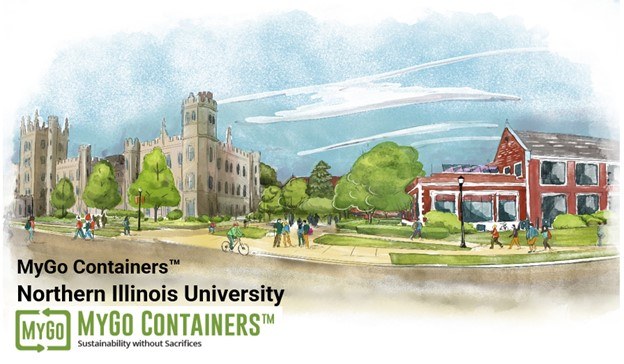Not long after Dan Papuga took over as the Unit Director at Northern Illinois University's (NIU) Neptune Dining Hall, he was faced with an unexpected and significant challenge. Like many organizations across the nation, his task became figuring out how to adapt services amidst the global Covid-19 pandemic.
Having spent 35 years in the food-service industry with a contract company, Papuga joined NIU to slow down and enjoy his final years before retirement. However, the pandemic forced him to quickly pivot, aiming to safely provide three meals a day (and two on weekends) to the university’s on-campus students. NIU, a Division 1 institution with approximately 18,000 total students—most of whom live off-campus or commute—normally served around 2,500 meals daily to 3,500 on-campus students, along with faculty and staff.
Fortunately, NIU had introduced a carry-out meal service prior to the pandemic due to student demand (though using a competitor’s container). At that time, only about 10% of meals were taken out. “When the pandemic hit, we had to switch entirely to carry-out and saw an 80% drop in on-campus students. We had to rethink our meal programs and ensure quick service,†Papuga explained.
Realizing the need for more robust containers, Papuga sought a brand that could meet their evolving needs. The ideal containers would feature multiple compartments, be sturdier, and better at retaining heat. “We went with MyGo because it fulfilled all our criteria,†he noted. “Previously, we assumed students ate their meals soon after picking them up. Now, since they had to eat in their rooms instead of common areas, we needed something stronger and more heat-retentive.â€
The introduction of MyGo Containers went smoothly. NIU began its program with 2,500 units, gradually phasing out older containers as they wore out. By the fall of 2021, Papuga expects MyGo to be the exclusive container used. The initial purchase was absorbed by the dining services department, but as more students return, a small annual surcharge of around $5 per student will be assessed to cover individual container costs. Replacement expenses will be integrated into the NIU food services budget.
Currently, the containers are in use at the two dining halls operating on campus. “Since we already had a reusable container program in place, adding MyGo was seamless. We’ve managed to keep at least 90% of the older containers in use,†Papuga stated.
To facilitate container returns, the department implemented a key fob system. Students exchange their fob for a container and receive a new fob upon returning it. Each semester begins with a welcome packet containing a key fob, salt and pepper shakers, reusable utensils, a straw, and instructions for exchanging used containers.
One pleasant surprise for busy college students is that they don’t need to wash the containers. Initially, many students diligently returned clean containers, but over time, fewer clean MyGos were received. Fortunately, the resilient polypropylene material ensures that the NIU staff can clean almost any container, regardless of its condition. High-temperature dishwashers handle issues like smells, breakage, and damage from excessive microwaving.
For Papuga’s team, the workload remains largely unchanged. For kitchen staff, the process is similar to before. Front-of-house operations and service procedures integrate well with MyGo containers, and staff appreciate dealing with just one type of container behind the counter. Once the campus reopens fully, NIU plans to reintroduce dishes for dine-in meals.
The only real change affects the dishwashing staff, as the containers must air dry. To manage this, NIU uses custom drying racks designed for MyGo containers. Papuga’s spacious facility allows for easy management of these racks. The company offers a large rolling rack that holds about 60 large rectangular containers, and the Neptune Dining Center has several to rotate through. “After containers exit the dishwasher, we place them on the racks. During our meal service downtime, we ensure they have 30 minutes to dry completely before stacking them for storage,†he explained.
Papuga envisions the MyGo program becoming permanent and expanding. “It’s cost-efficient, and we don’t have to deal with as much disposable waste,†he said. “Even when students can eat in the dining halls again, I think this program will continue to work well.â€
The convenience of the carry-out program benefits students, faculty, and staff alike. Students can grab meals between classes and take them along if they have short breaks around mealtimes.
Faculty appreciate the flexibility, as they can enjoy meals in their offices or outdoors. They value the variety and affordability of the options, but also enjoy having moments of solitude away from students.
The environmental impact is significant. NIU has eliminated disposable drinking straws, uses reusable canvas bags, and provides reusable flatware; plastic is available only upon request. “Looking at our kids, and now my grandkids, there’s only so much we can put in landfills,†Papuga said. “By implementing programs like this, we can make a real difference in the environment. We’re striving to reduce what ends up in the trash.â€
View MyGo Containers™ on Cook’s Direct.
We also have a print version here: Northern Illinois University & MyGo Containersâ„¢ Case Study.

Keywords:
Previous Post
Next Post
June 4th, 2021